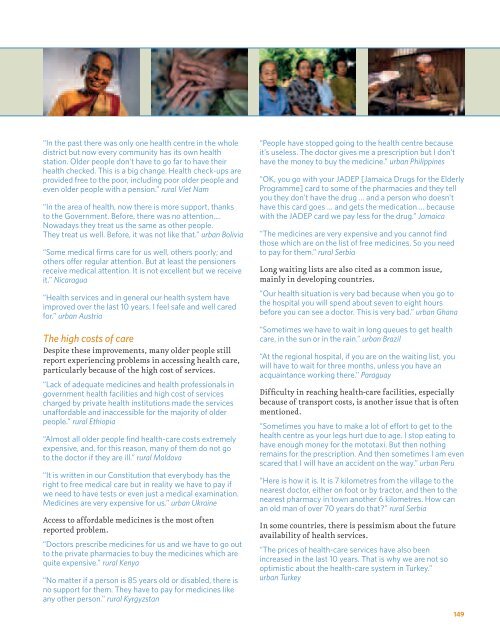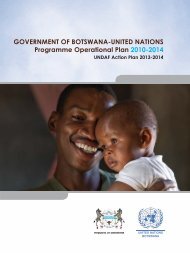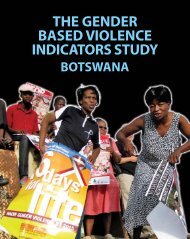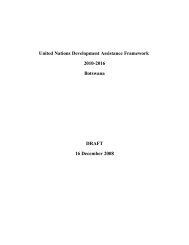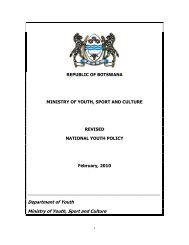Ageing in the Twenty-First Century: - HelpAge International
Ageing in the Twenty-First Century: - HelpAge International
Ageing in the Twenty-First Century: - HelpAge International
Create successful ePaper yourself
Turn your PDF publications into a flip-book with our unique Google optimized e-Paper software.
“In <strong>the</strong> past <strong>the</strong>re was only one health centre <strong>in</strong> <strong>the</strong> whole<br />
district but now every community has its own health<br />
station. Older people don’t have to go far to have <strong>the</strong>ir<br />
health checked. This is a big change. Health check-ups are<br />
provided free to <strong>the</strong> poor, <strong>in</strong>clud<strong>in</strong>g poor older people and<br />
even older people with a pension.” rural Viet Nam<br />
“In <strong>the</strong> area of health, now <strong>the</strong>re is more support, thanks<br />
to <strong>the</strong> Government. Before, <strong>the</strong>re was no attention....<br />
Nowadays <strong>the</strong>y treat us <strong>the</strong> same as o<strong>the</strong>r people.<br />
They treat us well. Before, it was not like that.” urban Bolivia<br />
“Some medical firms care for us well, o<strong>the</strong>rs poorly; and<br />
o<strong>the</strong>rs offer regular attention. But at least <strong>the</strong> pensioners<br />
receive medical attention. It is not excellent but we receive<br />
it.” Nicaragua<br />
“Health services and <strong>in</strong> general our health system have<br />
improved over <strong>the</strong> last 10 years. I feel safe and well cared<br />
for.” urban Austria<br />
The high costs of care<br />
Despite <strong>the</strong>se improvements, many older people still<br />
report experienc<strong>in</strong>g problems <strong>in</strong> access<strong>in</strong>g health care,<br />
particularly because of <strong>the</strong> high cost of services.<br />
“Lack of adequate medic<strong>in</strong>es and health professionals <strong>in</strong><br />
government health facilities and high cost of services<br />
charged by private health <strong>in</strong>stitutions made <strong>the</strong> services<br />
unaffordable and <strong>in</strong>accessible for <strong>the</strong> majority of older<br />
people.” rural Ethiopia<br />
“Almost all older people f<strong>in</strong>d health-care costs extremely<br />
expensive, and, for this reason, many of <strong>the</strong>m do not go<br />
to <strong>the</strong> doctor if <strong>the</strong>y are ill.” rural Moldova<br />
“It is written <strong>in</strong> our Constitution that everybody has <strong>the</strong><br />
right to free medical care but <strong>in</strong> reality we have to pay if<br />
we need to have tests or even just a medical exam<strong>in</strong>ation.<br />
Medic<strong>in</strong>es are very expensive for us.” urban Ukra<strong>in</strong>e<br />
Access to affordable medic<strong>in</strong>es is <strong>the</strong> most often<br />
reported problem.<br />
“Doctors prescribe medic<strong>in</strong>es for us and we have to go out<br />
to <strong>the</strong> private pharmacies to buy <strong>the</strong> medic<strong>in</strong>es which are<br />
quite expensive.” rural Kenya<br />
“No matter if a person is 85 years old or disabled, <strong>the</strong>re is<br />
no support for <strong>the</strong>m. They have to pay for medic<strong>in</strong>es like<br />
any o<strong>the</strong>r person.” rural Kyrgyzstan<br />
“People have stopped go<strong>in</strong>g to <strong>the</strong> health centre because<br />
it’s useless. The doctor gives me a prescription but I don’t<br />
have <strong>the</strong> money to buy <strong>the</strong> medic<strong>in</strong>e.” urban Philipp<strong>in</strong>es<br />
“OK, you go with your JADEP [Jamaica Drugs for <strong>the</strong> Elderly<br />
Programme] card to some of <strong>the</strong> pharmacies and <strong>the</strong>y tell<br />
you <strong>the</strong>y don’t have <strong>the</strong> drug … and a person who doesn’t<br />
have this card goes … and gets <strong>the</strong> medication … because<br />
with <strong>the</strong> JADEP card we pay less for <strong>the</strong> drug.” Jamaica<br />
“The medic<strong>in</strong>es are very expensive and you cannot f<strong>in</strong>d<br />
those which are on <strong>the</strong> list of free medic<strong>in</strong>es. So you need<br />
to pay for <strong>the</strong>m.” rural Serbia<br />
Long wait<strong>in</strong>g lists are also cited as a common issue,<br />
ma<strong>in</strong>ly <strong>in</strong> develop<strong>in</strong>g countries.<br />
“Our health situation is very bad because when you go to<br />
<strong>the</strong> hospital you will spend about seven to eight hours<br />
before you can see a doctor. This is very bad.” urban Ghana<br />
“Sometimes we have to wait <strong>in</strong> long queues to get health<br />
care, <strong>in</strong> <strong>the</strong> sun or <strong>in</strong> <strong>the</strong> ra<strong>in</strong>.” urban Brazil<br />
“At <strong>the</strong> regional hospital, if you are on <strong>the</strong> wait<strong>in</strong>g list, you<br />
will have to wait for three months, unless you have an<br />
acqua<strong>in</strong>tance work<strong>in</strong>g <strong>the</strong>re.” Paraguay<br />
Difficulty <strong>in</strong> reach<strong>in</strong>g health-care facilities, especially<br />
because of transport costs, is ano<strong>the</strong>r issue that is often<br />
mentioned.<br />
“Sometimes you have to make a lot of effort to get to <strong>the</strong><br />
health centre as your legs hurt due to age. I stop eat<strong>in</strong>g to<br />
have enough money for <strong>the</strong> mototaxi. But <strong>the</strong>n noth<strong>in</strong>g<br />
rema<strong>in</strong>s for <strong>the</strong> prescription. And <strong>the</strong>n sometimes I am even<br />
scared that I will have an accident on <strong>the</strong> way.” urban Peru<br />
“Here is how it is. It is 7 kilometres from <strong>the</strong> village to <strong>the</strong><br />
nearest doctor, ei<strong>the</strong>r on foot or by tractor, and <strong>the</strong>n to <strong>the</strong><br />
nearest pharmacy <strong>in</strong> town ano<strong>the</strong>r 6 kilometres. How can<br />
an old man of over 70 years do that?” rural Serbia<br />
In some countries, <strong>the</strong>re is pessimism about <strong>the</strong> future<br />
availability of health services.<br />
“The prices of health-care services have also been<br />
<strong>in</strong>creased <strong>in</strong> <strong>the</strong> last 10 years. That is why we are not so<br />
optimistic about <strong>the</strong> health-care system <strong>in</strong> Turkey.”<br />
urban Turkey<br />
149


